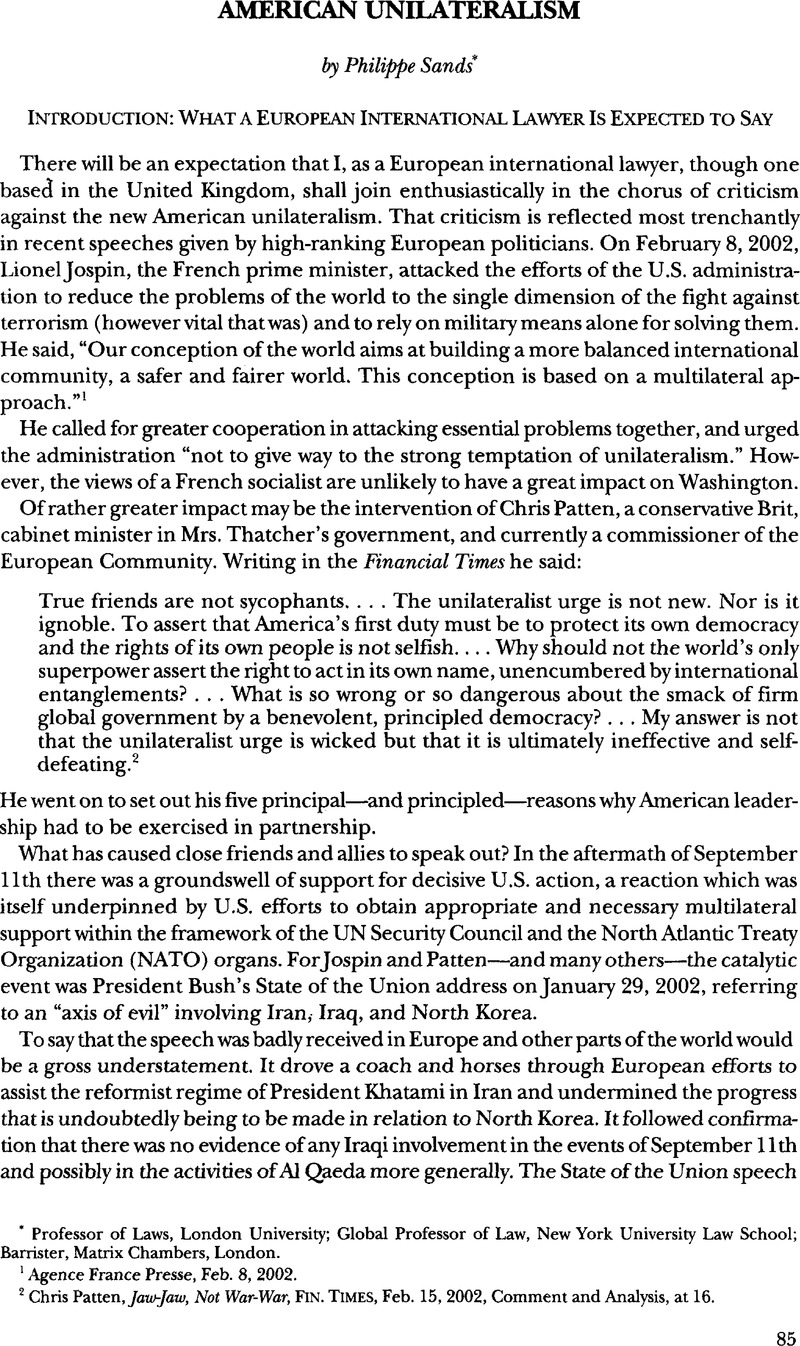Article contents
meeting-report
Published online by Cambridge University Press: 28 February 2017
Abstract

- Type
- American Unilateralism
- Information
- Copyright
- Copyright © American Society of International Law 2002
References
1 Agence France Presse, Feb. 8, 2002.
2 Patten, Chris, Jaw-Jaw, Not War-War, Fin. Times, Feb. 15, 2002 Google Scholar, Comment and Analysis, at 16.
3 See Letter from President Bush to Senators Hagel, Helms, Craig, and Roberts (Mar. 13, 2001), available at <http://www.whitehouse.gov/news/releases/2001/03/20010314.html>.
4 The withdrawal was formally notified on December 13, 2001, and is available at <http://www.whitehouse.gov/news/releases/2001/12/20011213-2.html>.
5 Shanker, Thorn, White House Says the U.S. Is not a Loner, Just Choosy, N.Y. Times, July 31, 2001, at A1 Google Scholar.
6 SC Res. 1368 (Sept. 12, 2001).
1 North Atlantic Treaty, Apr. 4, 1949, art. 5, 63 Stat. 2241, 34 UNTS 243.
8 Bumiller, Elisabeth & Perlez, Jane, After the Attacks: The Overview; Bush and Top Aides Proclaim Policy of “Ending” States that Back Terror; Local Airports Shut After an Arrest, N.Y. Times, Sept. 14, 2001, at A1 Google Scholar.
9 Gordon, Michael R., After the Attacks: The Strategy; A New War and Its Scale, N.Y. Times, Sept. 17, 2001, at A1 Google Scholar.
10 Detention, Treatment, and Trial of Certain Non-Citizens in the War Against Terrorism, 66 Fed. Reg. 57,933 (Nov. 13, 2001).
11 Section 7(b) provides, in relevant part:
With respect to any individual subject to this order—(1) military tribunals shall have exclusive jurisdiction with respect to offences by the individual; and (2) the individual shall not be privileged to seek any remedy or maintain any proceeding, directly or indirectly, or to have any such remedy or proceeding sought on the individual’s behalf, in (i) any court of the United States, or any State thereof, (ii) any court of any foreign nation, or (iii) any international tribunal.
Id. §7(b).
12 Geneva Convention Relative to the Treatment of Prisoners of War, Aug. 12, 1949, art. 5, 6 UST 3316, 75 UNTS 135 (entered into force Oct. 21, 1950). Article 5 provides: “Should any doubt arise as to whether persons, having committed a belligerent act and having fallen into the hands of the enemy, belong to any of the categories enumerated in Article 4, such persons shall enjoy the protection of the present Convention until such time as their status has been determined by a competent tribunal.”
13 S. Exec. Rep. No. 107-2 , at 5 (2001).
14 Multilateralism and US Foreign Policy: Ambivalent Engagement (Stewart Patrick & Shepard Forman eds., 2002).
15 Dupuy, Pierre-Marie, The Place and Role of Unilateralism in Contemporary International Law, 11 Eur. J. Int’l L. 19, 20 (2000)CrossRefGoogle Scholar.
16 Reisman, W. Michael, Unilateral Action and the Transformations of the World Constitutive Process: The Special Problem of Humanitarian Intervention,” 11 Eur. J. Int’l L. 3, 5 (2000)CrossRefGoogle Scholar.
17 Alvarez, José, Multilateralism and Its Discontents, 11 Eur. J. Int’l L. 393, 394 (2000)CrossRefGoogle Scholar.
18 Reisman, supra note 16, at 3.
19 Dupuy, supra note 15, at 20.
20 Breard v. Greene, U.S. Sup. Ct. (Apr. 14, 1998), 37 ILM 810, 824 (1998).
21 LaGrand Case (Ger. v. U.S.), ICJ (June 27, 2001), 40 ILM 1069 (2001).
22 Vienna Convention on Consular Relations, Apr. 24, 1963, art. 36, 21 UST 77, 596 UNTS 261.
23 See Sands, Philippe, The Future of International Adjudication, 14 Conn. J. Int’l L. 1-13 (1999)Google Scholar.
24 Grant, Charles, Powerless in Europe, 59 Prospect 21 (2001)Google Scholar.
- 3
- Cited by


